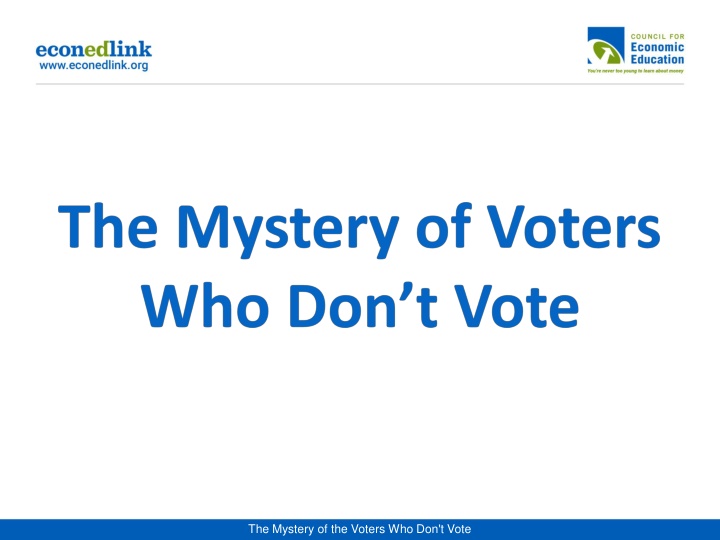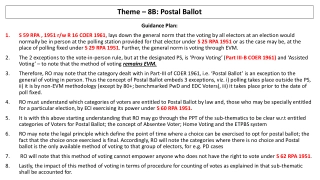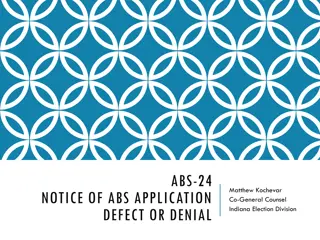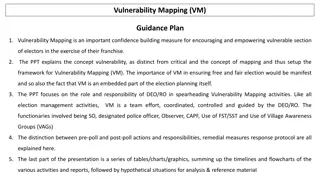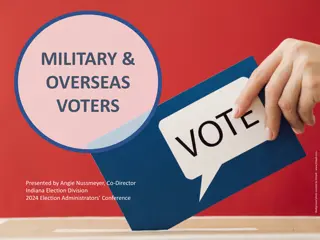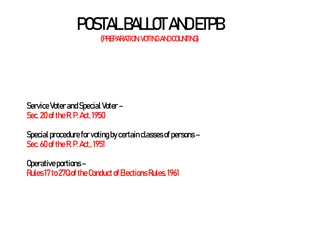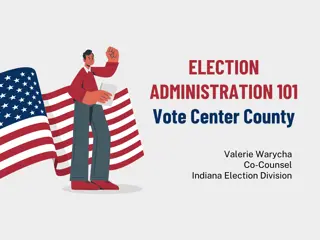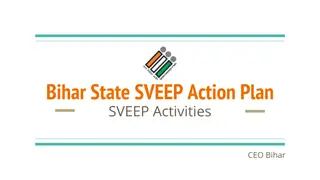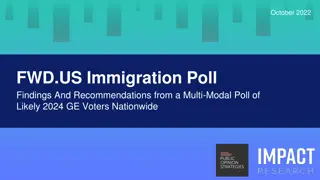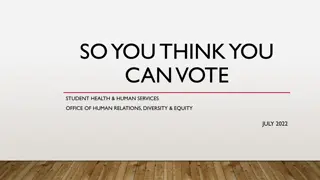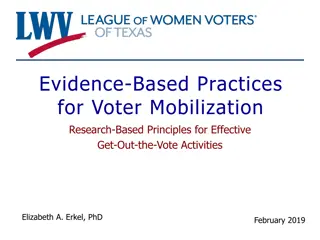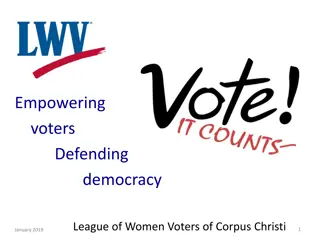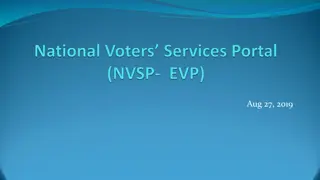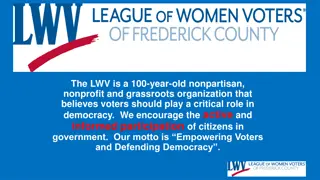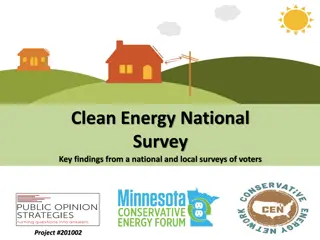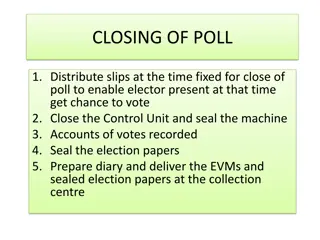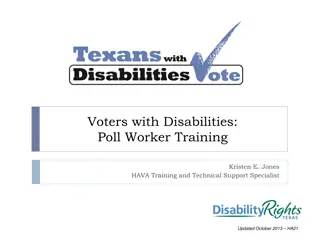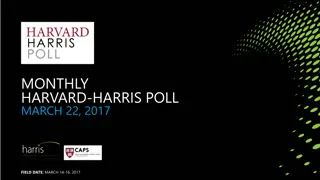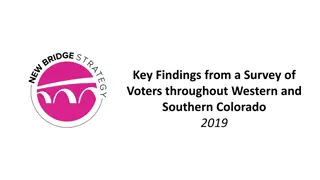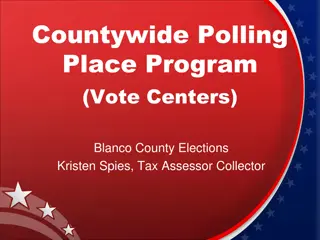The Mystery of Voters Who Don't Vote
Having the right to vote is crucial for a healthy democracy, yet voter turnout remains low in many countries. Explore the reasons behind this phenomenon, including the impact of incentives, economic decision-making, and changing rules. Discover how Motor Voter legislation plays a role in voter registration ease and why it's essential to understand people's choices and behaviors in the voting process.
Download Presentation

Please find below an Image/Link to download the presentation.
The content on the website is provided AS IS for your information and personal use only. It may not be sold, licensed, or shared on other websites without obtaining consent from the author.If you encounter any issues during the download, it is possible that the publisher has removed the file from their server.
You are allowed to download the files provided on this website for personal or commercial use, subject to the condition that they are used lawfully. All files are the property of their respective owners.
The content on the website is provided AS IS for your information and personal use only. It may not be sold, licensed, or shared on other websites without obtaining consent from the author.
E N D
Presentation Transcript
Countries Australia Belgium Canada France Germany Israel South Korea Sweden Switzerland United States Percentage of Voters 87% 83% 79% 78% 76% 69% 68% 62% 56% 39% The Mystery of the Voters Who Don't Vote
Australia Belgium Canada France Germany Israel South Korea Sweden Switzerland United States 79% 87% 62% 68% 69% 76% 78% 83% 39% 56% https://www.pewresearch.org/fact-tank/2018/05/21/u-s-voter-turnout-trails-most- developed-countries/ The Mystery of the Voters Who Don't Vote
People choose. People choose the alternative which seems best to them because it involves the least cost and greatest benefit. People's choices involve costs. Cost is the second best choice people give up when they make their best choice. People respond to incentives in predictable ways. Incentives are actions or rewards that encourage people to act. When incentives change, people's behavior changes in predictable ways. People create economic systems that influence individual choices and incentives. How people cooperate is governed by written and unwritten rules. As rules change, incentives change and behavior changes. People gain when they trade voluntarily. People can produce more in less time by concentrating on what they do best. The surplus goods or services they produce can be traded to obtain other valuable goods or services. People's choices have consequences that lie in the future. The important costs and benefits in economic decision making are those which will appear in the future. Economics stresses making decisions about the future because it is only the future that we can influence. We cannot influence things that have happened in the past. The Mystery of the Voters Who Don't Vote
The Economic Mystery Having the right to vote is a major component to the success of a healthy democracy and many Americans consider the right to vote to be one of the most important rights they have as citizens. Despite these strong beliefs, only 56% of eligible voters voted in the most recent presidential election. Why??? The Mystery of the Voters Who Don't Vote
Motor Voter Legislation. Because of Motor Voter legislation and other innovations, it is relatively easy for most Americans to register to vote. https://www.justice.gov/crt/about-national-voter-registration-act The Mystery of the Voters Who Don't Vote
How Many Elections Each Year? At the federal, state and local levels, there are many elections in the United States. An American who voted in all the elections for which he or she was eligible would do a lot of voting. https://ballotpedia.org/Elections_by_state_and_year The Mystery of the Voters Who Don't Vote
Long Lines. In presidential elections, long lines of voters often form at the polls. https://www.usatoday.com/story/news/politics/elections/2016/11/08/v oting-polls-election-day/93201770/ The Mystery of the Voters Who Don't Vote
Finding Issues. It can be difficult for voters to find reliable information about candidates and issues especially local candidates and state or local issues addressed in referenda. http://www.ontheissues.org/default.htm The Mystery of the Voters Who Don't Vote
Two Senators. Each state elects two United States Senators. www.senate.gov/pagelayout/reference/e_one_section_no_teasers/org _chart.htm The Mystery of the Voters Who Don't Vote
Slim Margins. Few elections in the United States are ever decided by one or two votes. (Although the 2000 Presidential election came very close!) www.infoplease.com/ipa/A0876793.html The Mystery of the Voters Who Don't Vote
Primary and General. There are two kinds of elections primary and general. http://www.magazineusa.com/us/info/show.aspx?unit=elections&doc= 1,002&dsc=Primary_and_General_Elections The Mystery of the Voters Who Don't Vote
26th Amendment. The 26th Amendment to the Constitution made 18 the legal voting age. https://legal-dictionary.thefreedictionary.com/26th+Amendment The Mystery of the Voters Who Don't Vote
At the Polls. Voting takes place in polling places. www.vote411.org/ The Mystery of the Voters Who Don't Vote
2. How Many Elections Each Year? At the federal, state and local levels, there are many elections in the United States. An American who voted in all the elections for which he or she was eligible would do a lot of voting. 3. Long Lines. In presidential elections, long lines of voters often form at the polls. 4. Finding Issues. It can be difficult for voters to find reliable information about candidates and issues especially local candidates and state or local issues addressed in referenda. 6. Slim Margins. Few elections in the United States are ever decided by one or two votes. (Although the 2000 Presidential election came very close!) The Mystery of the Voters Who Don't Vote
